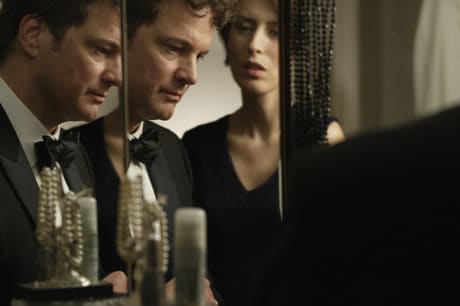When Did You Last See Your Father? explores ideas of "seeing a person beyond that of their physical presence. Interpreting human complexity as something thats determined through a series of experiences and vacillating, ambivalent feelings, Father acts as a visual poem that tries to make sense of a father-son relationship through their most memorable and arresting life moments. A refusal to settle for glib resolutions and emotional simplifications is what allows this film to stand out from the many others of this ilk.
In early childhood, Blake (Colin Firth) viewed his father Arthur (Jim Broadbent) as a mythic being whose childish whimsy refused to abide by the rules that applied to everyone else. Inevitably, family secrets and the very nature of human imperfection lead to Blakes conflicting and occasionally hostile feelings towards his father, which are only further propelled by the masked feelings of isolation and disappointment that his mother Kim (Juliet Stevenson) radiates.
When confronted with the impending death of his dad, Blake recounts the life experiences that have shaped his personal ideologies and perceptions. From unfortunate camping trips to liberating driving lessons on the beach to sexual awakenings with a live-in maid (Elaine Cassidy), Blake comes to understand the many levels of human passion and intent that exist within well-intentioned but inherently flawed relationships.
Tuckers trademark emotionally driven direction, which uniquely captured loss of control in Hilary & Jackie and feelings of isolation and disappointment in Shopgirl, lyrically defines the fragmented nature of human perception throughout Father. The characters are often seen obscured or duplicated through mirrors or barriers, which help to define the inner-conflict and frequent misunderstandings that come about. The story isnt defined by linearity or narrative cohesion but through very real and maturely explored sentiment, which can either be heralded or criticised, depending on the expectations brought by the viewer.
Visually arresting moments juxtaposed with minor insights regarding social dynamics within a family make Father a uniquely powerful cinematic experience. A lack of specified catharsis or classically narrative progression may deter viewers who are used to being told how to feel but should please those who allow themselves to be taken along for the ride.
(Mongrel Media)In early childhood, Blake (Colin Firth) viewed his father Arthur (Jim Broadbent) as a mythic being whose childish whimsy refused to abide by the rules that applied to everyone else. Inevitably, family secrets and the very nature of human imperfection lead to Blakes conflicting and occasionally hostile feelings towards his father, which are only further propelled by the masked feelings of isolation and disappointment that his mother Kim (Juliet Stevenson) radiates.
When confronted with the impending death of his dad, Blake recounts the life experiences that have shaped his personal ideologies and perceptions. From unfortunate camping trips to liberating driving lessons on the beach to sexual awakenings with a live-in maid (Elaine Cassidy), Blake comes to understand the many levels of human passion and intent that exist within well-intentioned but inherently flawed relationships.
Tuckers trademark emotionally driven direction, which uniquely captured loss of control in Hilary & Jackie and feelings of isolation and disappointment in Shopgirl, lyrically defines the fragmented nature of human perception throughout Father. The characters are often seen obscured or duplicated through mirrors or barriers, which help to define the inner-conflict and frequent misunderstandings that come about. The story isnt defined by linearity or narrative cohesion but through very real and maturely explored sentiment, which can either be heralded or criticised, depending on the expectations brought by the viewer.
Visually arresting moments juxtaposed with minor insights regarding social dynamics within a family make Father a uniquely powerful cinematic experience. A lack of specified catharsis or classically narrative progression may deter viewers who are used to being told how to feel but should please those who allow themselves to be taken along for the ride.
